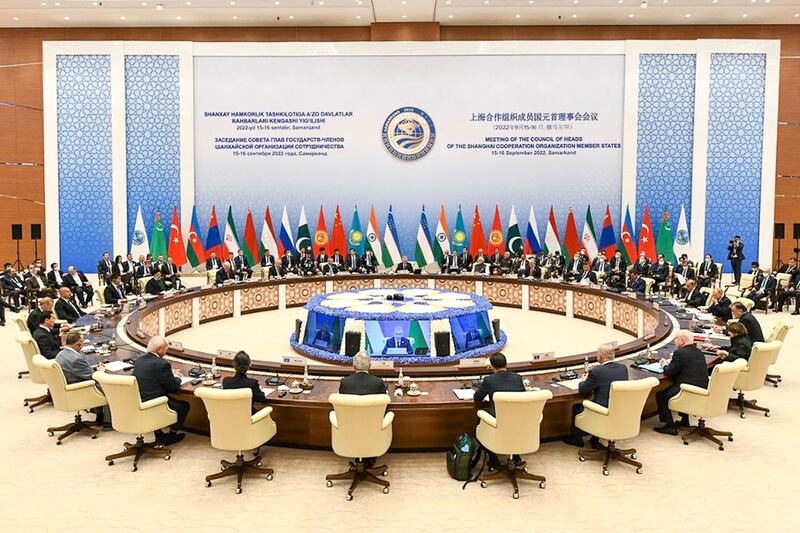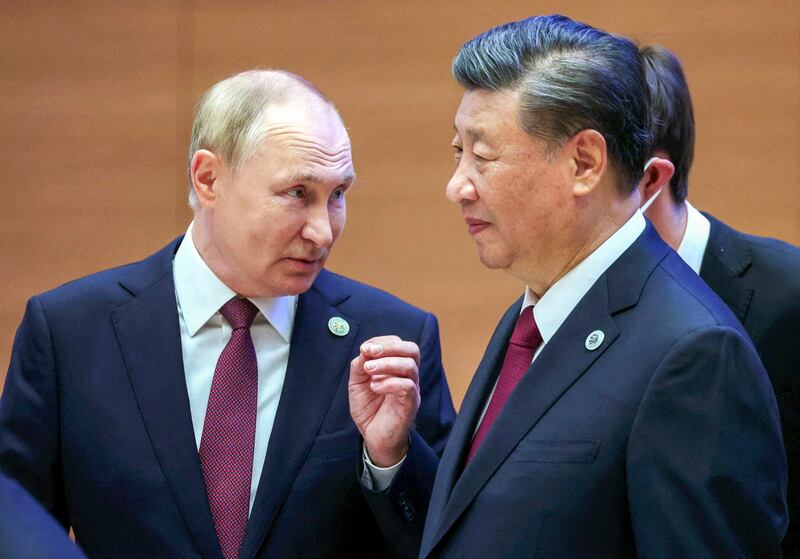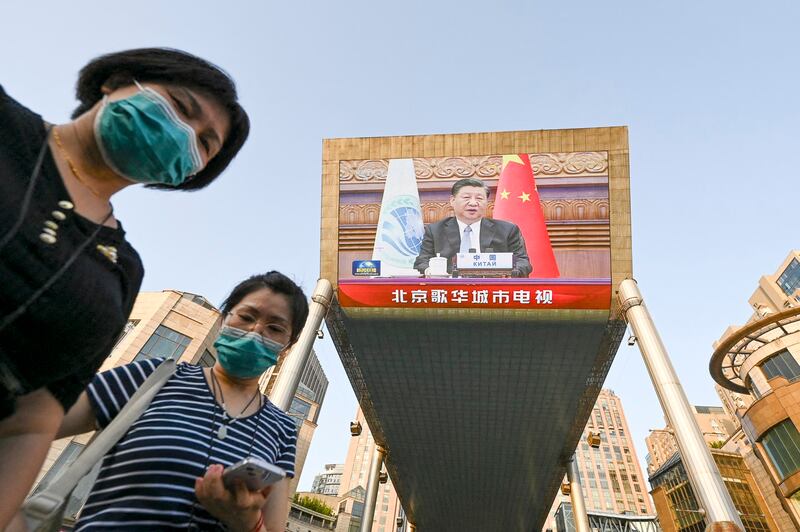Chinese President Xi Jinping arrived in Kazakhstan on Tuesday morning for the 24th annual meeting of the Shanghai Cooperation Organization, a group created by Beijing and Moscow to manage their shared – and competing – geopolitical interests in Central Asia.
Xi touched down in the Kazakh capital of Astana ahead of four days of meetings with leaders of the five primary Central Asian nations – Kazakhstan, Kyrgyzstan, Tajikistan, Turkmenistan, and Uzbekistan – as well as periphery members Russia, Iran, India and Pakistan.
Russian President Vladimir Putin will also attend this week's meetings, with plans to meet with Xi privately for talks. He will also meet with Turkish President Recep Tayyip Erdogan, who will be in attendance as a "dialogue partner" of the regional grouping.

Chinese Foreign Ministry spokesperson Hua Chunying said Xi’s trip comes as China assumes the rotating presidency of the regional group this year, and that Xi will also pay official state visits to Kazakhstan and Tajikistan during the trip.
“China believes that this summit will consolidate more consensus among all parties, chart a new chapter of cooperation, and make positive contributions to promoting security, stability, development, revitalization,” Hua said at a press briefing on Monday.
Established in 2001 by China and Russia, this year’s summit is expected to focus on the economy, trade and energy, but Russia’s invasion of Ukraine and its ramifications will also be on the table.
Who’s backyard?
Central Asia has long been put forward by international relations strategists as a reason that Moscow and Beijing may never be able to forge long-term geopolitical bonds, with any friendship between the two nations said to be not able to withstand a rivalry over the region.
However, with Russia’s growing economic and diplomatic reliance on its eastern neighbor amid its invasion of Ukraine, Moscow appears to have put its interests in Central Asia on the backburner for now.

Rushan Abbas, executive director of the U.S.-based Campaign for Uyghurs, said that this year’s meeting of the Shanghai Cooperation Organization comes as China cuts massive diplomatic in-roads into what was once indisputably Russia’s sphere of influence.
“Following Russia’s invasion of Ukraine, China has been aggressively marching into Central Asia, once a Russian backyard, and strengthening its political and economic relations with Kazakhstan, Uzbekistan and Kyrgyzstan,” Abbas told Radio Free Asia.
“These countries, fearing a similar fate like Ukraine, are also increasingly taking a pro-China position,” she said.
China has long aimed to expand its influence in Central Asia but had been tied back by the region’s lasting cultural and political ties to Moscow given its former life in the Soviet Union, said Anders Corr, the principal of the New York-based political risk firm Corr Analytics.
The region has “gas, many minerals, and inexpensive labor,” he said. But it’s not only that: “China sees it as semi-strategic,” Corr explained, because it could allow rail links and oil-and-gas pipelines to Europe.
For the Central Asian nations, meanwhile, the biggest draw of closer relations with China would be access to its vast market as Russia’s war economy creates future trade opportunities with their former patron.

But Corr said there may be another element at play, with the former Soviet republics looking wearily at Moscow’s plans for Ukraine.
“They may also be trying to use China as a counterweight against Russia in order to solidify their independence – there may be an element of that,” he said. “They may be thinking that somehow getting closer to China will give them a way to keep Russia at bay.”
All roads lead to Europe
Putin will be playing defense while in Astana, as he is probably displeased by Beijing’s growing influence.
“Putin very badly wants to maintain and strengthen his links to those five countries,” said William Duiker, a former U.S. diplomat and now professor emeritus of East Asian studies at Pennsylvania State University.
“There is absolutely no doubt that there is an element of geopolitical competition and rivalry going on between Moscow and Beijing in this region,” he said. “Anything that happens in that area related to either of these countries is primarily related to the geopolitical situation.”
But while Putin’s main attentions are focussed on Ukraine, he added, Beijing will be focussed on securing the construction of a key railroad through Central Asia that would link China to the edges of Europe and allow trade to flow there without permission of the Russians.
“If completed, this would bypass Russia and go through the Central Asian states, the Caucasus, Turkey, and to the Aegean Sea,” he said, referring to an eastern Mediterranean bay.
“Chinese leaders see this as an important alternative route for goods going to Europe, especially if their current route through Siberia becomes problematic.”
For Abbas of the Campaign for Uyghurs, though, the growing ties between China and the Turkic nations of Central Asia are a concern for Uyghurs facing genocide in China, many of whom in the past have looked west to escape Beijing’s grip and religious persecution.
The warming ties were leading to China “exporting its repressive policies and tightening its grip on the Uyghur population living in these nations,” she said, including those who have escaped China.
“It is crucial for the U.S.-led free world to pay close attention to Central Asia,” Abbas said, “and not allow China to corrupt and coerce these countries to support its authoritarian form of governance.”
Edited by Alex Willemyns and Malcolm Foster.
